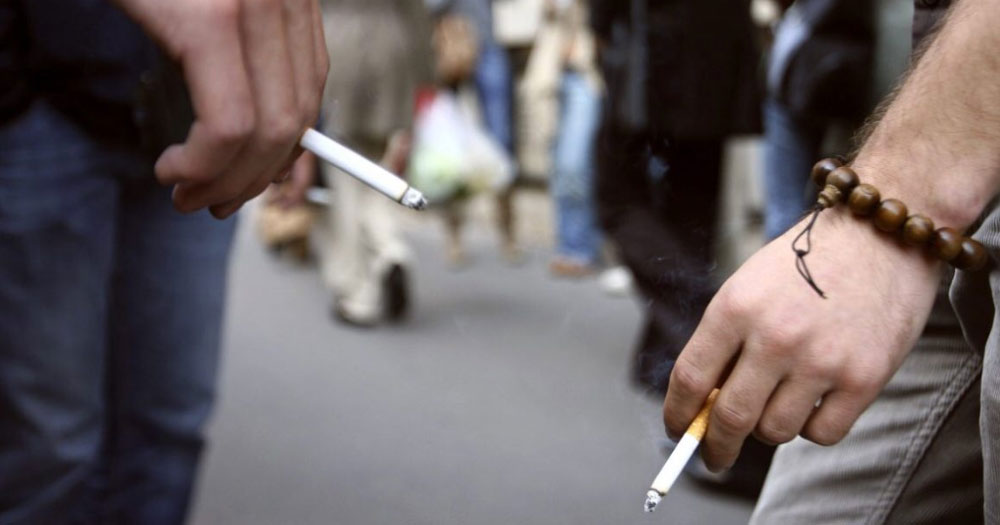Not only is it discourteous to smoke and walk in Japan, it is illegal to do so in many parts of the country.
Those caught doing so can be punished with a fine of 20,000 yen (S$247) in certain areas.
The ban was first implemented by the local government in Chiyoda ward in Tokyo.
Offenders might be caught once in a while, but that's because most Japanese generally frown upon this behaviour.
Respectful of other people's spaces
There are practical reasons for taking punitive action against smoking in Japan.
Public spaces there can be so crowded that holding a lighted cigarette lends itself to accidents.
Cigarettes held by smokers are at a height that is also at the eye level of children. This can cause injuries to the face of young ones who come into contact with the falling ash from the cigarettes.
The following sign from the Japan Tobacco "smoking manners" campaign, illustrates this:
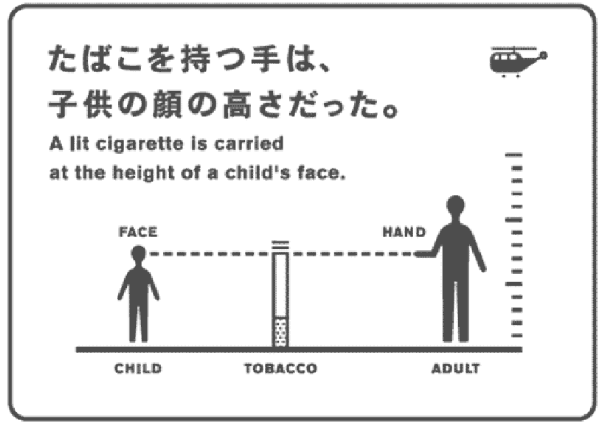 Image via Japan Tobacco
Image via Japan Tobacco
Some even say lighted cigarettes affect people on wheelchairs too.
Ironically, Japan Tobacco -- the entity that did this campaign -- is the largest cigarette producer and seller in Japan.
Cigarette company promoting good smoking manners
For all the good etiquette promoted in Japan, it is important to recognise the conflicts of interests involved.
The smoking industry is huge there and the aim is to get people to smoke, but to do so in acceptable ways and getting the public to acquiesce.
Japan Tobacco also tries to encourage smokers to be considerate to non-smokers by launching a 'Smoking Manners' campaign some 30 years ago.
Here's an example of a sign that encourages smokers to discard their cigarette butts in a responsible way.
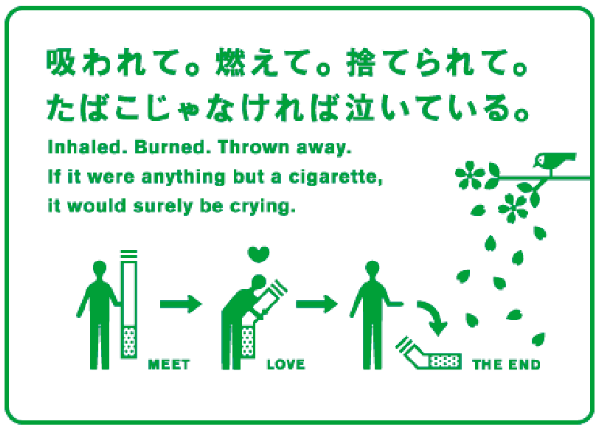 Image via Japan Tobacco
Image via Japan Tobacco
And here's another one warning smokers about affecting other members of the public with their secondhand smoke:
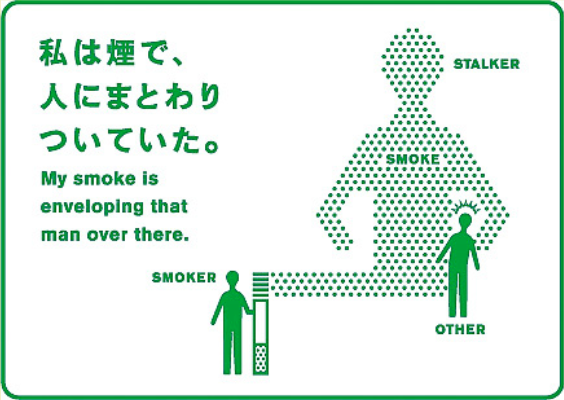 Image via Japan Tobacco
Image via Japan Tobacco
Designated smoking areas in public
More than 240 Japanese municipalities restrict smoking on the streets.
The following sign means it is forbidden to smoke on that particular street:
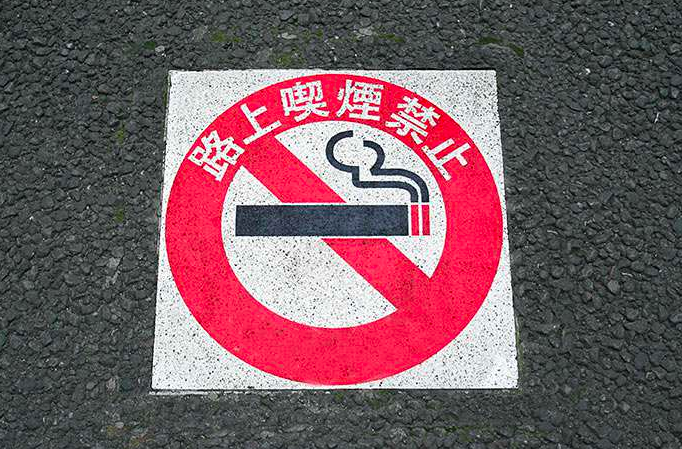 Image via Japan Monthly Web Magazine
Image via Japan Monthly Web Magazine
This means smokers can only light up in designated smoking zones such as this:
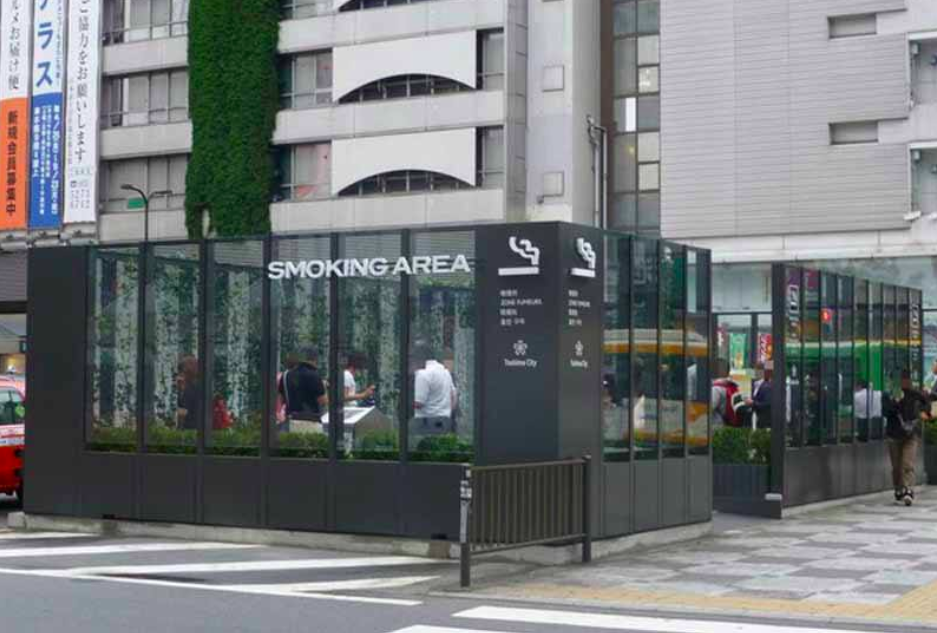 Image via Abroad Japan
Image via Abroad Japan
There are also "No-Smoking" patrol officers patrolling the streets to remind the people not to smoke there, as secondhand smoke can be harmful to other members of the public who do not smoke.
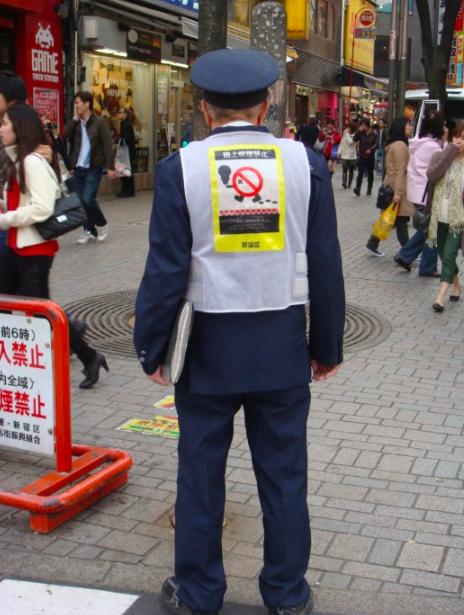 Image via Hub Pages
Image via Hub Pages
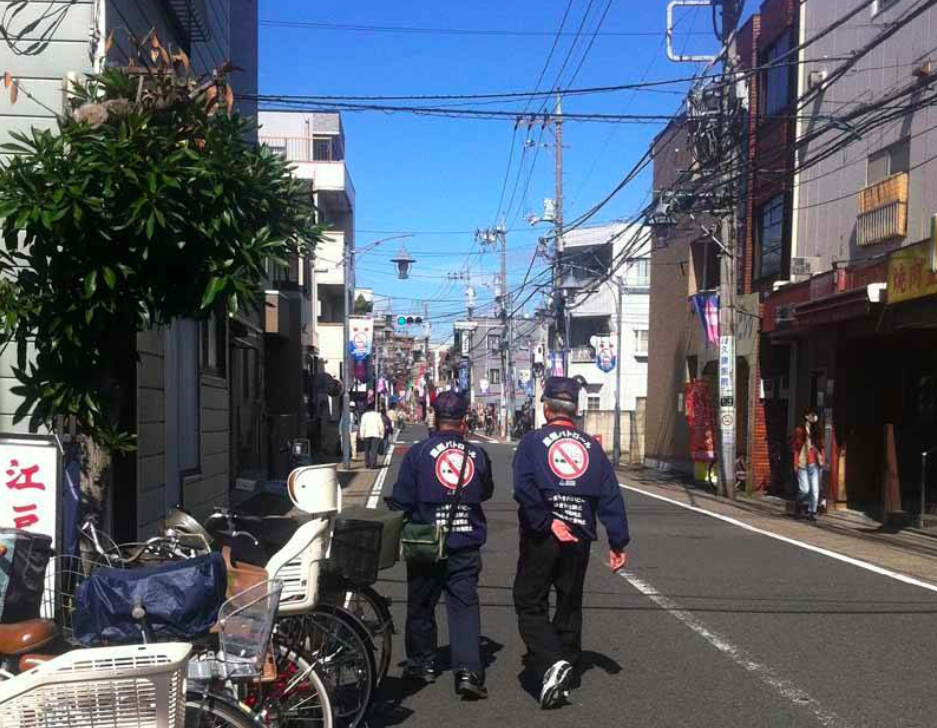 Image via Wikimedia
Image via Wikimedia
Anti-smoking regulations still quite backwards
Considering how Japan was considered a smoker's paradise just a few decades ago, it is interesting to see how social norms guiding the dos and don'ts when it comes to smoking have developed and taken root there.
The percentage of daily smokers in Japan has declined over the years, from 30.3 percent in 2003 to 18.3 percent in 2017.
But the country still has a long way to go.
Smoking still allowed in many indoor places
Smoking is still allowed in most restaurants, bars and cafes, unlike many developed countries.
It is sometimes almost impossible to avoid breathing in secondhand smoke even if you are seated at a no-smoking area.
According to Japan Times, restaurants that meet certain criteria can allow customers to smoke without creating dedicated smoking rooms, as long as they put up signs outside that say smoking is allowed.
The situation is such that as many as 40 percent of non-smokers in restaurants and bars are exposed to secondhand smoke, according to a government survey.
About 15,000 people, mainly women and children, die annually in Japan because of secondhand smoke, according to government and World Health Organisation (WHO) estimates.
To make matters worse, restaurant and bar owners are resistant to anti-smoking laws within their establishments as they are worried about the potential effect on business if smoking is outlawed there.
Powerful interests at play
And although the country wants to change its image as a smoking paradise ahead of the 2020 Olympics, it is unable to make much headway due to its powerful tobacco lobby.
The governing Liberal Democratic Party (LDP) has long resisted anti-smoking laws because the Japanese government, which owns one third of the shares of Japan Tobacco, earns about 3 percent of its total revenue from cigarette taxes, reported The New York Times.
Furthermore, according to ABC News, Japan Tobacco said it does not believe that there is a link between breathing in secondhand smoke and disease among non-smokers -- contrary to what the WHO says.
It is also important to note that anti-smoking laws in Japan were brought in in the first place to promote good manners and cleanliness on the streets, rather than for heath reasons.
Some smokers simply don't care
Old habits die hard too.
For instance, although the Shibuya ward removed a smoking zone in the bustling area around the statue of the faithful dog Hachiko outside Shibuya Station in November 2016, smokers continue to smoke there, despite cleaners working to remove the cigarette butts.
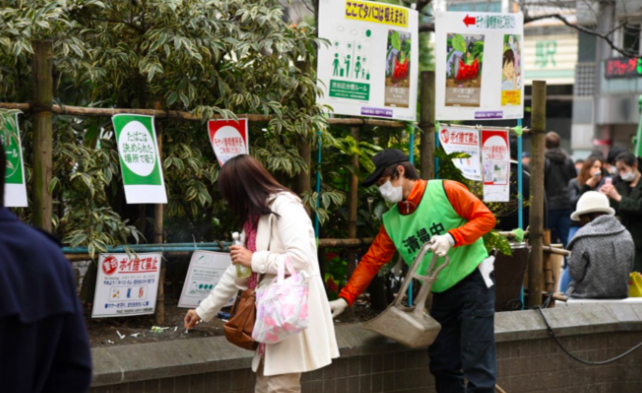 Image by Ryo Ikeda
Image by Ryo Ikeda
[related_story]
As a result, Shibuya ward officials are considering implementing harsher penalties against people who smoke in public areas.
Some smokers continue to smoke at no-smoking areas too.
Those who are caught give reasons such as it being a force of habit and being unable to find a smoking zone nearby.
But given the Japanese culture of showing empathy outwardly, smokers and non-smokers working around one another's sensitivities appears to be one way to go about it, besides strict enforcement regulation kicking in.
Top image via Madame Riri
If you like what you read, follow us on Facebook, Instagram, Twitter and Telegram to get the latest updates.
